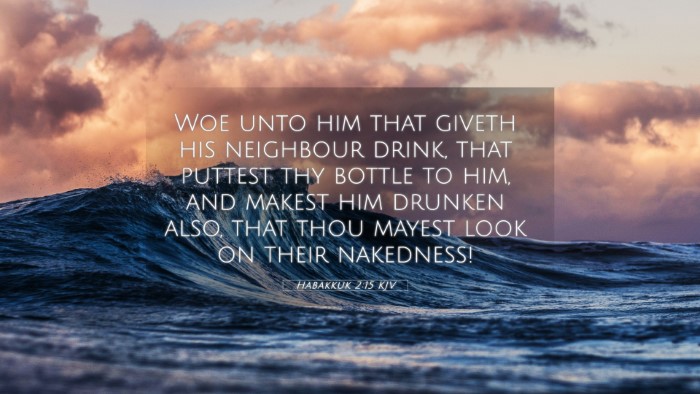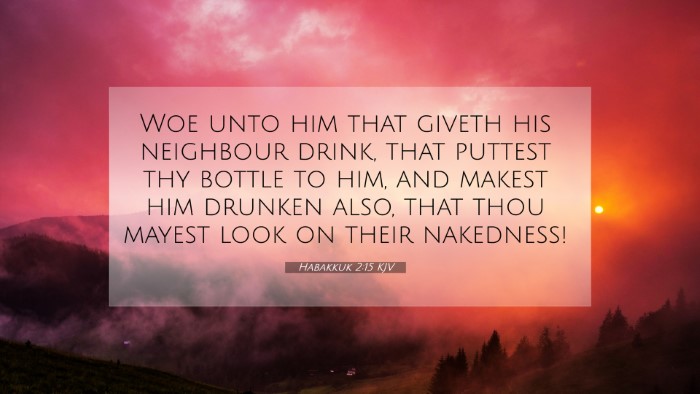Old Testament
Genesis Exodus Leviticus Numbers Deuteronomy Joshua Judges Ruth 1 Samuel 2 Samuel 1 Kings 2 Kings 1 Chronicles 2 Chronicles Ezra Nehemiah Esther Job Psalms Proverbs Ecclesiastes Song of Solomon Isaiah Jeremiah Lamentations Ezekiel Daniel Hosea Joel Amos Obadiah Jonah Micah Nahum Habakkuk Zephaniah Haggai Zechariah MalachiHabakkuk 2:15 Similar Verses
Habakkuk 2:15 Cross References
Woe unto him that giveth his neighbour drink, that puttest thy bottle to him, and makest him drunken also, that thou mayest look on their nakedness!
Uncover the Rich Themes and Topics of This Bible Verse
Listed below are the Bible themes associated with Habakkuk 2:15. We invite you to explore each theme to gain deeper insights into the Scriptures.
Habakkuk 2:15 Cross Reference Verses
This section features a detailed cross-reference designed to enrich your understanding of the Scriptures. Below, you will find carefully selected verses that echo the themes and teachings related to Habakkuk 2:15 KJV. Click on any image to explore detailed analyses of related Bible verses and uncover deeper theological insights.
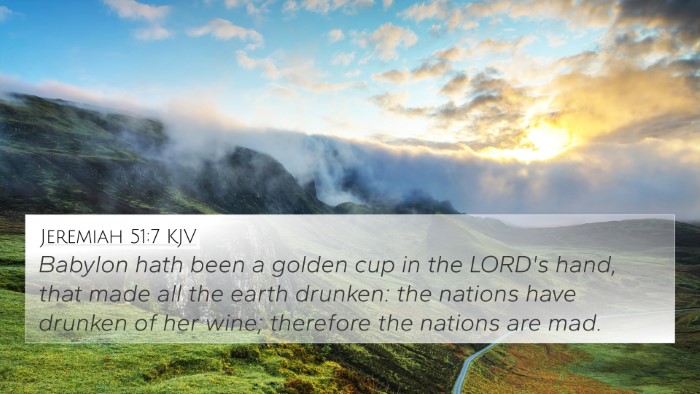
Jeremiah 51:7 (KJV) »
Babylon hath been a golden cup in the LORD's hand, that made all the earth drunken: the nations have drunken of her wine; therefore the nations are mad.
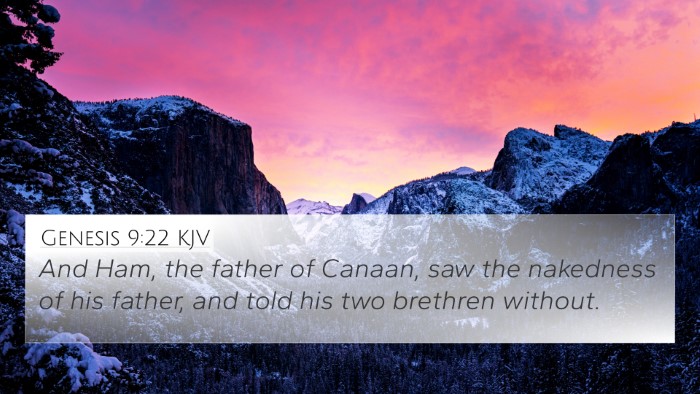
Genesis 9:22 (KJV) »
And Ham, the father of Canaan, saw the nakedness of his father, and told his two brethren without.
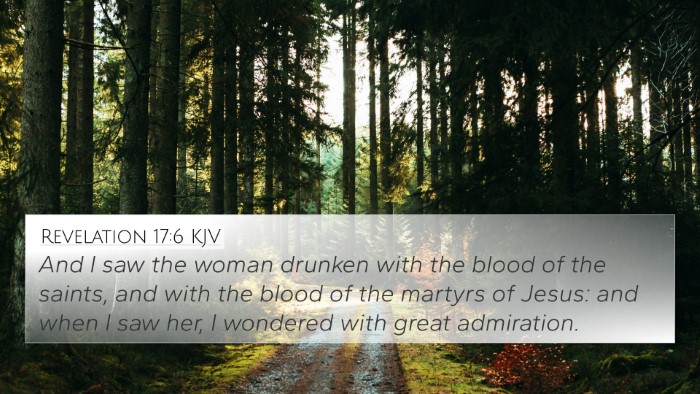
Revelation 17:6 (KJV) »
And I saw the woman drunken with the blood of the saints, and with the blood of the martyrs of Jesus: and when I saw her, I wondered with great admiration.
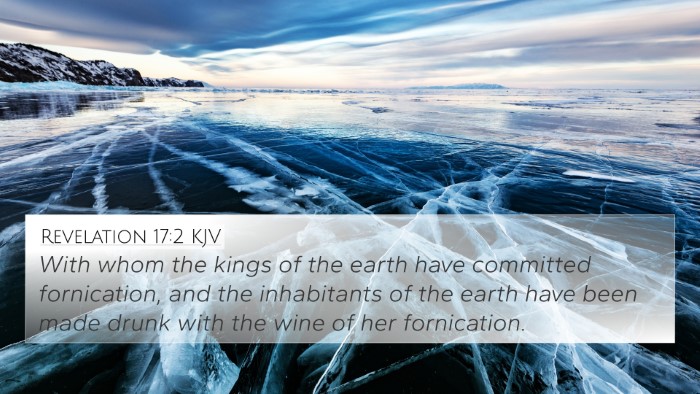
Revelation 17:2 (KJV) »
With whom the kings of the earth have committed fornication, and the inhabitants of the earth have been made drunk with the wine of her fornication.
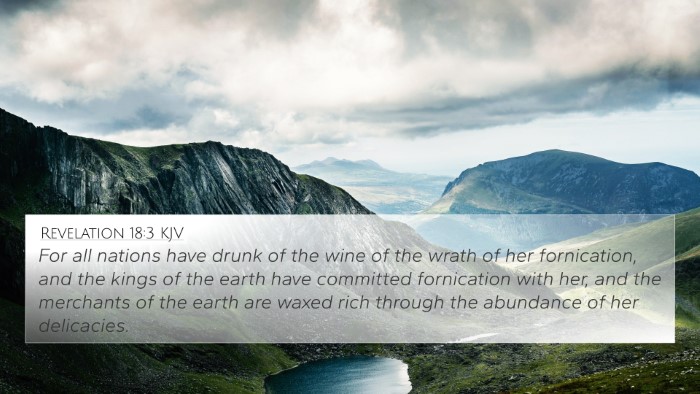
Revelation 18:3 (KJV) »
For all nations have drunk of the wine of the wrath of her fornication, and the kings of the earth have committed fornication with her, and the merchants of the earth are waxed rich through the abundance of her delicacies.
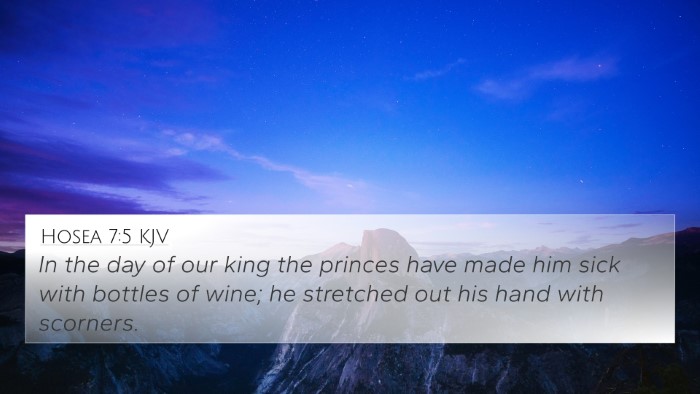
Hosea 7:5 (KJV) »
In the day of our king the princes have made him sick with bottles of wine; he stretched out his hand with scorners.
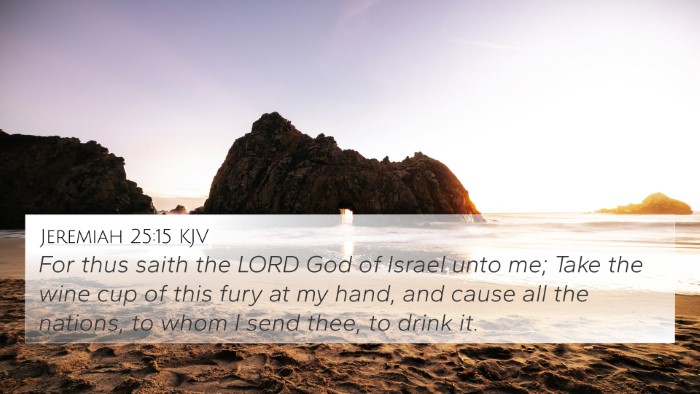
Jeremiah 25:15 (KJV) »
For thus saith the LORD God of Israel unto me; Take the wine cup of this fury at my hand, and cause all the nations, to whom I send thee, to drink it.
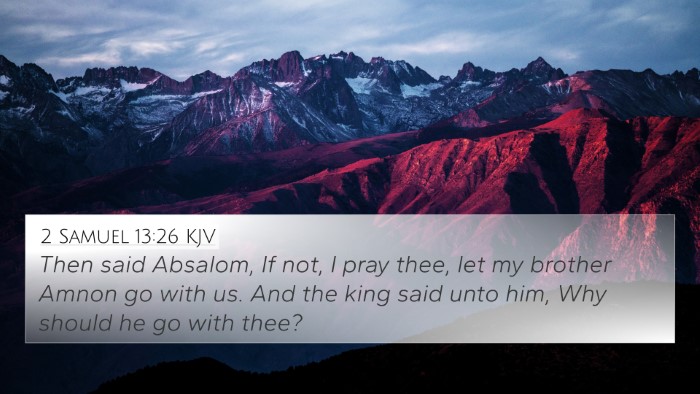
2 Samuel 13:26 (KJV) »
Then said Absalom, If not, I pray thee, let my brother Amnon go with us. And the king said unto him, Why should he go with thee?

2 Samuel 11:13 (KJV) »
And when David had called him, he did eat and drink before him; and he made him drunk: and at even he went out to lie on his bed with the servants of his lord, but went not down to his house.
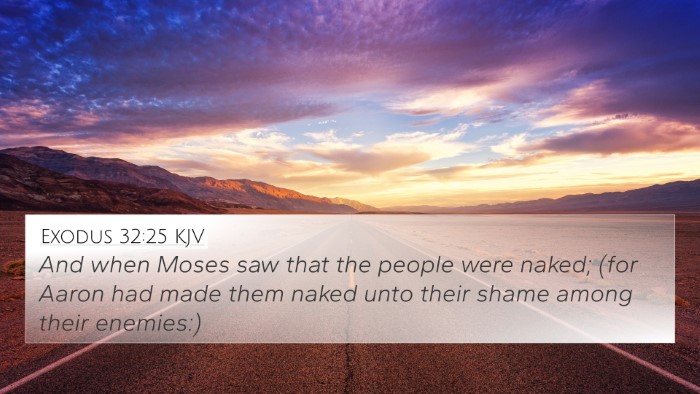
Exodus 32:25 (KJV) »
And when Moses saw that the people were naked; (for Aaron had made them naked unto their shame among their enemies:)
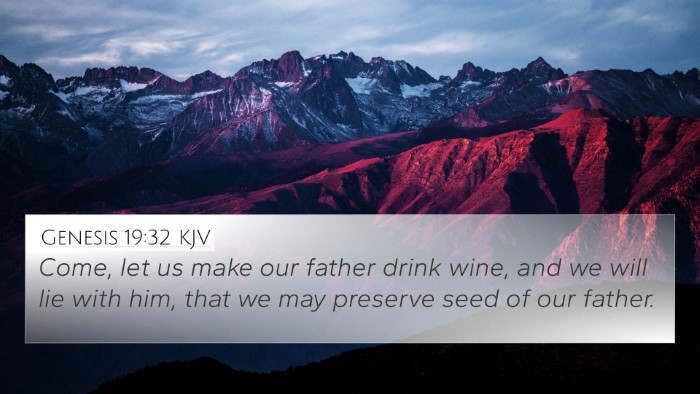
Genesis 19:32 (KJV) »
Come, let us make our father drink wine, and we will lie with him, that we may preserve seed of our father.
Habakkuk 2:15 Verse Analysis and Similar Verses
Understanding Habakkuk 2:15
Habakkuk 2:15 warns against the practice of leading others into sin and the consequences it brings. This verse serves as a powerful reminder of the moral responsibility individuals have towards others.
Verse Context
This verse is part of a larger context in which God reassures Habakkuk that justice will be served against those who oppress and exploit the innocent. Habakkuk confronts the troubling reality of injustice, and this verse reflects a specific example of moral transgression: causing one's neighbor to drink, which has deeper implications of seduction and leading others away from God.
Commentary Insights
-
Matthew Henry:
Henry emphasizes that this act of making others drink metaphorically signifies not only intoxicating with literal drink but seducing them into vice. It speaks to the spiritual peril of leading others to sin, and identifies the consequent shame and condemnation that awaits those who do so.
-
Albert Barnes:
Barnes highlights how the action of giving drink to a neighbor is a symbol of enticing another into wrongdoing. He iterates the idea that such acts lead not only to degradation of the individual but also reflect a broader societal decay, reminding believers of their duty to uphold righteousness.
-
Adam Clarke:
Clarke points out the spiritual ramifications of this behavior, indicating that the intoxicating influence of sin blurs moral clarity. He interprets “making them drunk” also in a literal context, stressing that the sins one encourages in others will ultimately lead to one's own downfall.
Key Themes and Applications
This verse invites reflection on several important themes for application today:
- Moral Responsibility: Understanding our influence on others and the weight of leading them toward sin.
- Spiritual Intoxication: The dangers of engaging in behavior that clouds judgment or distances individuals from God.
- Accountability: The inevitable consequences faced by those who lead others astray, both in this life and in the afterlife.
Cross-References
Habakkuk 2:15 can be linked to several other Biblical texts for a deeper understanding:
- Proverbs 20:1: "Wine is a mocker, strong drink is raging: and whosoever is deceived thereby is not wise."
- 1 Corinthians 8:9: "But take heed lest by any means this liberty of yours become a stumbling block to them that are weak."
- Matthew 18:6: "But whoso shall offend one of these little ones which believe in me, it were better for him that a millstone were hanged about his neck, and that he were drowned in the depth of the sea."
- James 3:1: "My brethren, be not many masters, knowing that we shall receive the greater condemnation."
- Romans 14:21: "It is good neither to eat flesh, nor to drink wine, nor any thing whereby thy brother stumbleth, or is offended, or is made weak."
- Isaiah 5:11: "Woe unto them that rise up early in the morning, that they may follow strong drink; that continue until night, till wine inflame them!"
- Galatians 5:19-21: "Now the works of the flesh are manifest, which are these; Adultery, fornication, uncleanness, lasciviousness..."
Practical Takeaways
In meditating on Habakkuk 2:15 and its insights, consider the following practical takeaways:
- Reflect on the influences you have over others. Are you encouraging them toward positive or negative behaviors?
- Assess your actions and ensure they align with a moral compass reflective of your faith.
- Engage in open dialogue about moral responsibility within your community and faith-based activities, fostering a supportive environment.
Conclusion
Habakkuk 2:15 serves not just as a warning but also as a profound lesson on moral influence, accountability, and the spiritual consequences of our actions. Engaging in a comparative Bible verse analysis can yield deeper insights into how our lives resonate with biblical teachings, enabling a transformative understanding of our faith.

